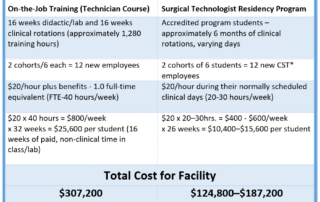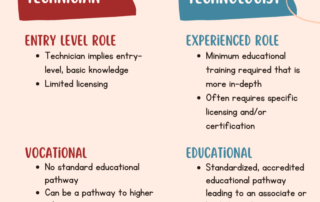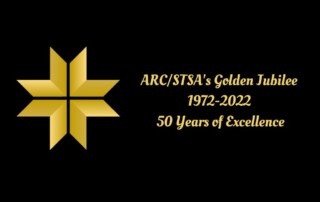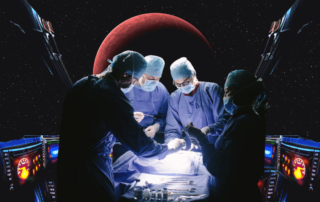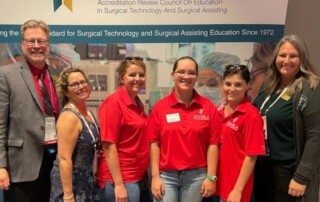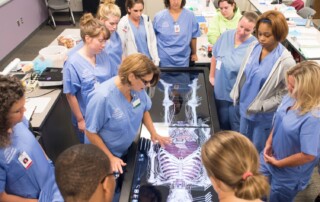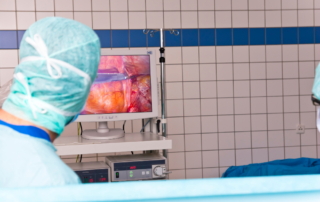Let AccredX Ease Accreditation Stress
What is AccredX and what makes it different from other conferences? AccredX is designed to support our 400+ surgical technology and surgical assisting programs with accreditation-focused continuing education and professional dvelopment. AccredX offers hands-on workshops, proven program management strategies, and best practices in surgical technology and surgical assisting education, to provide educators with the necessary tools to achieve and [...]
Update from Executive Director Ron Kruzel on Workforce Efforts and Cooperation Nationwide
By Ron Kruzel, MA, CAE, CST, FAST Many thanks to you—all our ARC/STSA educators—who work day in and day out to provide a quality education to your students, develop strong relationships with your partners, including local healthcare centers, and elevate the professions in your communities, states, and across the nation. You make a difference! We want you to know [...]
Hospital Recruitment: Surgical Technologist Residency Program
By Rob Blackston, M.Ed., CST, CSFA, FAST The surgical technologist staffing shortage is a serious issue that can have a significant impact on patient care and safety. It is essential to address this shortage by increasing the availability of, and access to, education programs that attract and retain more individuals in this field. A few months ago, a local [...]
Technologist vs. Technician: What’s the Difference, and Why It Matters
A resource to share with your community partners. Click to enlarge
A Clinical Nurse Educator and a CST Discuss the Shortage of Surgical Technologists
Clinical Nurse Educator Renegade (Ren) Scott-Feagle, MSN/Ed, BSHS/M, RN, CNOR, and Traveling Certified Surgical Technologist Silviana Vina, BS, CST, who worked together as colleagues at the University Medical Center of Southern Nevada (UMCSN) in Las Vegas, Nevada, share their thoughts on the shortage of surgical technologists and their crucial intraoperative role. Ren Scott-Feagle (RSF): Silviana, thank you so much [...]
Student Credits Career Growth and Leadership Opportunities to a Strong Educational Foundation in Sterile Processing
By Katie Richie, BS, CHL, CIS, CRCST, CSPDT, CST Healthcare practitioners say that the sterile processing department is the heart of the hospital–without it, everything fails within the hospital. Similarly, surgical technologists depend on the work of sterile processing technicians, as the relationship between the operating room and sterile processing department is critically important. I believe that students who [...]
Congrats to Programs Earning Continuing and Initial Accreditation-November 2022-January 2023
ARC/STSA would like to congratulate the surgical technology programs that have recently received awards of initial and continuing accreditation. Please join us in acknowledging the dedication and hard work it took for these programs to reach these critical milestones. Surgical Technology Initial Accreditation Award: Carrington College, Phoenix, AZ Baptist Health Sciences University, Memphis, TN Surgical Technology Continuing Accreditation Award: Coastal Pines [...]
Here’s to You: Celebrating our Educators and 50 Years of Excellence in Accreditation
Our golden anniversary year is coming to an end, but stories of our longest continuously-accredited programs will continue. Stay tuned for more in 2023, and enjoy these stories of four programs each accredited for more than four decades. Featured in this issue are the surgical technology programs at Parkland College, Champaign, IL; Ivy Tech Community College, Lafayette, IN; Southeast [...]
Success Strategies in Sixty Seconds
By Chris Ahearn, AAS, CST When I transitioned from the OR to a program director position at a new surgical technology program, I wanted to learn all I could about how to create and maintain a successful program. As educators across the country pursue excellence every day and successfully graduate competent, entry-level surgical technologists, the ARC/STSA and EdAccred continue [...]
AccredX Wrap-Up
By Jerad Claytor, MSHE, CST From the exciting Hands-On Learning Lab and collaborative Round Table Discussions to the accreditation-focused presentations and ending with an AFE Workshop, the first AccredX conference held October 6-8 was a HIT! Educators from across the country were able to listen, learn, share, and network with colleagues to better improve their time in the classroom… [...]
Surgery in Space Part II: The Countdown Has Begun
By Chris Ahearn, AAS, CSTThe June ARC/STSA newsletter highlighted ways that the surgical technology community might help to solve some difficult scenarios encountered when considering surgery in space. But surgical technologists’ out-of-this-world skills also have applications a little closer to home – the past years have brought a surge of growth to the telemedicine, telesurgery, and robotics fields.Telemedicine can be [...]
Spotlight on ARC/STSA’s 2022 Scholarship Recipients
The ARC/STSA is proud to announce the recipients of the 2022 scholarship awards. This year, ARC/STSA awarded 10 student scholarships of $500 each and one $1,000 educator scholarship. Join us in celebrating these accomplished recipients, whose quotes are shared below, and be sure to spread the word about our 2023 scholarship applications, now posted on our Scholarship page. Chris [...]
Congrats to Programs Earning Continuing and Initial Accreditation
ARC/STSA would like to congratulate the surgical technology programs that have recently received awards of initial and continuing accreditation. Please join us in acknowledging the dedication and hard work it took for these programs to reach these critical milestones. Surgical Technology Initial Accreditation Award: Camden County College, Blackwood, NJ Concorde Career College, Memphis, TN The University of Memphis, Memphis, TN [...]
Message From the Executive Director: The Nationwide Surgical Technologist Shortage
By Ron Kruzel, MA, CAE, CST, FAST, ARC/STSA Executive Director Greetings to all, and I hope your summer is off to an amazing start! For two long years, our education community has learned to live in the new reality of a world with COVID, responding with amazing agility and resilience and adapting in a moment’s notice to the ever-changing [...]
Surgery in Space: The CST and Their Role in Problem Solving
By Chris Ahearn, AAS, CST, and featuring Dr. Josef F. Schmid, III With an early 2030 launch date planned for mankind’s first mission to Mars, NASA flight surgeons and their teams have been hard at work. With 240 days between liftoff and touchdown, crews onboard are susceptible to all manner of human maladies. From headaches to bone resorption, acute [...]
August 1st: Accreditation Summer Updates!
By ARC/STSA Accreditation Team As you celebrate the success of student graduations and look forward to the well-deserved summer break, we wanted to remind you about several accreditation documents with an August 1, 2022, effective date; including the new Standards and Guidelines for the Accreditation of Educational Programs in Surgical Technology (Standards), the Core Curriculum for Surgical Assisting, 4th [...]
Congratulations to ARC/STSA 2022 Scholarship Winners!
The ARC/STSA is proud to announce its 2022 scholarship recipients. This year, ARC/STSA awarded 10 student scholarships of $500 each and one $1,000 educator scholarship. Join us in celebrating these accomplished recipients, shared below, and stay tuned for more information about their stories throughout the summer. You can also learn more about the recipients on the scholarship page of [...]
Students’ Experience at National Conference: Where a Passion for Profession and Education Come Together
By Amy Broussard, AAS, CHL, CSFA, CRCST, CST, FAST, and Eboni Saurage, EdD, CST, FAST The Association of Surgical Technologists (AST) held its 52nd Surgical Technology Conference in New Orleans, LA, on June 3-5, 2022. The conference drew more than 1,200 enthusiastic active and associate members which included many educators, students and recent graduates. We reached out to learn [...]
Why Attend AccredX?
What is AccredX and what makes it different from other conferences? AccredX is the first annual conference designed to support our 400+ surgical technology and surgical assisting programs with accreditation-focused continuing education. AccredX offers hands-on workshops, proven program management strategies, and best practices in surgical technology and surgical assisting education, to provide educators with the necessary tools to achieve [...]
ARC/STSA’s Golden Jubilee: Celebrating 50 Years of Accreditation and Program Excellence
ARC/STSA is proud to celebrate our golden anniversary this year – 50 years of accreditation and education excellence. This year we’ll be looking back at the last five decades — from our humble beginnings in December 1972 as the Joint Review Committee on Educational Programs for the Operating Room Technician (JRC-ORT) to today, as we provide national accreditation services [...]
Congratulations to Programs Earning Continuing and Initial Accreditation
ARC/STSA would like to congratulate the surgical technology programs that have recently received awards of initial and continuing accreditation. Please join us in acknowledging the dedication and hard work it took for these programs to reach these critical milestones. Surgical Technology Initial Accreditation Award: Ozarka College, Mountain View, AR Surgical Technology Continuing Accreditation Award: Central Piedmont Community College, Charlotte, NC [...]
Special Thank You to Helga Olson, MA, MSc., CSA, CSFA
The ARC/STSA wishes to extend a special thank you to Helga Olson, MA, MSc., CSA, CSFA. Olson served from 2016–2022 on the ARC/STSA Board of Directors – Subcommittee on Accreditation for Surgical Assisting (SASA), and we are so grateful for her volunteerism and six years of tireless service contributed. Olson, pictured left, earned her Bachelor of Science in Counseling [...]
Digital Dissection with the Anatomage Table
By Rebecca Hall, MS, CRCST, CSA, CST, FAST Recognized for the sixth consecutive year as a tech-savvy college by the Center for Digital Education, Delta College incorporates technology to improve curriculum delivery and service across its programs. Following this tradition, our surgical first assistant and surgical technology programs were the first in the state of Michigan to use the [...]
Interview with Dr. Erin White-Mincarelli on New Annual Report; Plus, Frequently Asked Annual Report Questions
Featuring Erin White-Mincarelli, PhD, CST, FAST Dr. Erin White-Mincarelli, surgical technology program director at Montgomery County Community College in Pennsylvania and ARC/STSA board member, speaks with ARC/STSA’s education coordinator, Erin Monroy, about the new Annual Report platform and provides guidance for report submission, which has been extended through August 1, 2022. Erin Monroy: How lucky am I to interview a [...]
Enhancing Simulated Procedures with Mock Medical
By Jay Barrueta, AAS, CST Creativity and hands-on learning are a necessity for keeping students engaged, but what other solutions can instructors use to put our creative energy to better use and provide students the best preparation for surgery? Our program has started using Mock Medical drop-ins, trainers, and laparoscopic tower to give students a realistic surgical simulation experience [...]

Surgical Technology Sequencing for Student Success
By Melanie Graves, MBA, CST
In surgery, precision isn’t optional — it’s vital. Every member of the operating room team must be efficient, alert and disciplined. Surgical technologists play a key role in this critical environment, and the way they are trained matters. Our program uses a step-by-step, sequential training approach that gives students the knowledge, skills and confidence to succeed — not just in class, but in the operating room as well. When the teaching method is built around aseptic technique, timely clinical placements and well-integrated observation experiences, it doesn’t just build better techs — it protects patients.
First Semester: Building a Strong Foundation
In our surgical technology program, the first semester is carefully structured to focus on foundational skills, without introducing specialty cases. Students begin by learning the core principles of asepsis — the backbone of surgical safety. At this stage, the curriculum follows a strict sequence. Students progress from understanding what a preference card is to learning how to pull a case, mastering the names of instruments, opening a surgical case, perfecting how to scrub, gown and glove, and preparing a basic exploratory laparotomy.
This approach ensures that students understand not only what to do but why it matters. Aseptic practices aren’t just skills to memorize — they are life-saving measures. Teaching them early and thoroughly helps students develop discipline, attention to detail, and the mindset needed for surgical teamwork.
Observation Clinicals: Bridging the Gap
While mastering these foundational steps, students also attend a weekly observation clinical rotation. These observation days are intentionally placed during the first semester — after core concepts are taught but before hands-on clinicals begin. This timing allows students to see the surgical environment in action, reinforcing what they’re learning in the classroom and lab.
During these observations, students watch surgical teams perform live procedures. They learn how sterile technique is maintained under pressure, how team members communicate, and how the flow of a surgery unfolds in real time. Just as important, they see where to stand, learn when to speak and how to respect and preserve the sterile field.
This early exposure shapes their understanding of the OR, ignites curiosity and builds motivation. When they return to the lab, they bring better questions and sharper focus, connecting classroom knowledge to real-world practice.
Clinical Readiness Exam: The Gatekeeper to Clinical Practice
Before students can begin their hands-on clinical rotations, they must pass a comprehensive final hands-on skills assessment called the Clinical Readiness Exam. This exam is designed to ensure that students have mastered essential competencies: setting up sterile fields, identifying instruments, maintaining asepsis, and demonstrating confidence in the basic sequence of surgical case preparation.
This high standard protects both students and patients. Clinical sites expect students to be capable, prepared and safe. Requiring mastery before placement ensures that students enter the OR as contributors, not as liabilities.
Specialty Cases Come After the Basics
Only after passing the Clinical Readiness Exam do students transition into their clinical rotations, where the focus shifts to specialty surgeries. This timing is intentional. By this stage, students are no longer in the learning phase of how to handle instruments or keep a sterile field — they’ve already mastered those skills. Now, they can focus on learning the nuances of various specialties such as orthopedics, neurology, gynecology and more.
This sequence allows students to absorb complex information in context. They’re not distracted by basic technique or overwhelmed by unfamiliar environments. Instead, they’re ready to adapt, assist and grow into the role of surgical technologist with confidence and clarity.
Structured Training, Stronger Technologists
When surgical technology is taught in a well-ordered, sequential format — grounded in aseptic principles, supported by observation clinicals and timed appropriately for hands-on practice — the results speak for themselves. Students gain more than technical ability. They learn to think critically, act decisively and uphold the safety of the surgical field with integrity.
They understand the “why” behind every step, understand the connection to the “how”, and they’re equipped to support the surgical team from day one. From their first semester to their final rotation, they develop into professionals who are prepared, capable and committed to patient care.
Conclusion
Surgical technology is a discipline where preparation, precision and patient protection intersect. Teaching it in sequential order — with aseptic technique as the foundation, early observation as reinforcement, and clinical placements timed after demonstrated readiness — transforms students into professionals. In our program, students learn the basics first, master their skills in the lab, and only then enter the clinical field to explore specialty surgeries. This structure produces not only skilled technologists but also thoughtful, reliable team members who understand their vital role in safeguarding patient lives.
Melanie Graves, MBA, CST, is the Program Director and Department Chair of Surgical Technology at Austin Community College in Austin, TX. She graduated from the same program in December 2015 and scrubbed in Austin and Cedar Park until 2022. In January of 2020, she began teaching for ACC’s Surgical Technology program alongside those who taught her, and she moved into her role as the Program Director in August of 2023.



